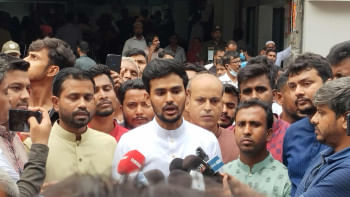Some provisions still not RPO-proper
Jamaat-e-Islami's charter still has some provisions not in conformity with the country's constitution and the Representation of People Order (RPO) even after the recent changes in it.
The party brought some changes in its charter recently and submitted it to the EC in efforts to meet the criteria for retaining registration with the commission.
But it still risks losing registration for those provisions which run counter to the country's constitution.
The RPO provides that a party shall not be qualified for getting registered with the EC if its objectives and any provision of its charter run counter to the country's constitution.
Faced with the EC's repeated pressure, Jamaat has deleted from its constitution the phrases "establishing just rule of Islam through organised efforts," and "bringing about necessary changes to the state system to ensure complete observance of Islam".
It has now replaced those with the phrases, "establishing just rule through democratic means".
Even the party's charter seems to have accepted parliament's plenary lawmaking power bestowed by the country's constitution by deleting the phrases "refuse to accept anyone except Allah as law-making authority".
Jamaat's Legal Affairs Secretary Jasim Uddin Sarker told this correspondent on Wednesday, "We have brought the changes to respect the RPO. We hope the Election Commission will now be satisfied with the changes."
The party's charter still contains provisions that still speak for establishing rule of Islam, although the country's constitution does not allow it.
For example, Jamaat's programmes still speak of creating public awareness about the necessity of establishing Islam and following Islam everywhere in life, and organising people willing to be part of the struggle for establishing Islam everywhere in life.
Even after the recent amendments, Jamaat charter still has some provisions contradicting the RPO and the country's constitution. The RPO and the constitution oppose any discrimination regarding religion, race, caste, language or sex.
But Jamaat's charter makes discrimination on grounds of religion as a non-Muslim is not allowed to become the party chief. The charter allowed non-Muslims to become members of the party in 2008 after introducing a provision in it to meet the criteria for registration. But non-Muslims too must work for realising the Jamaat's objectives which include establishing the rule of Islam.
When his attention was drawn, Jasim Uddin said they followed the EC's instructions to bring amendments to the party charter.
Before the parliamentary polls held in December 2008, Jamaat got registered with the EC by bringing some provisional changes in its charter. Then an expert committee formed by the EC identified that some provisions in the Jamaat charter, including the one for establishing rule of Islam, contradict the country's constitution.
After around four years, Jamaat amended its charter and submitted it to the EC on December 2.
On receipt of Jamaat's amended charter, Election Commissioner Abdul Mobarak told journalists the EC would now examine it.

 For all latest news, follow The Daily Star's Google News channel.
For all latest news, follow The Daily Star's Google News channel. 



Comments